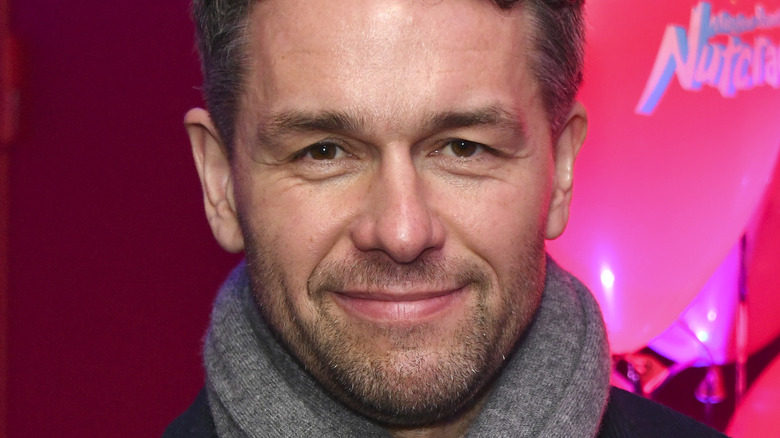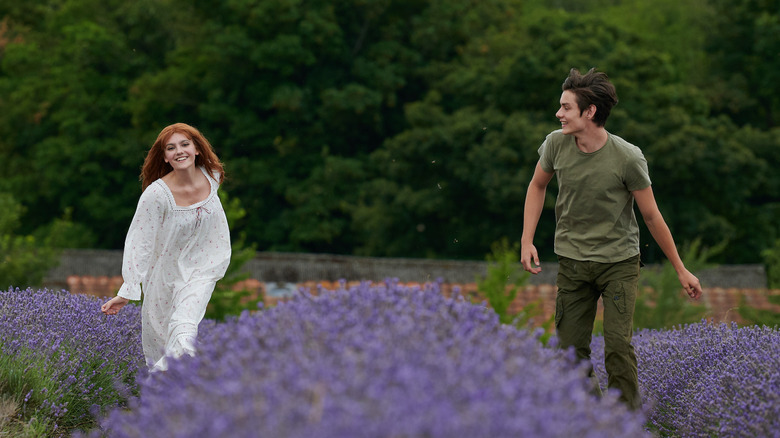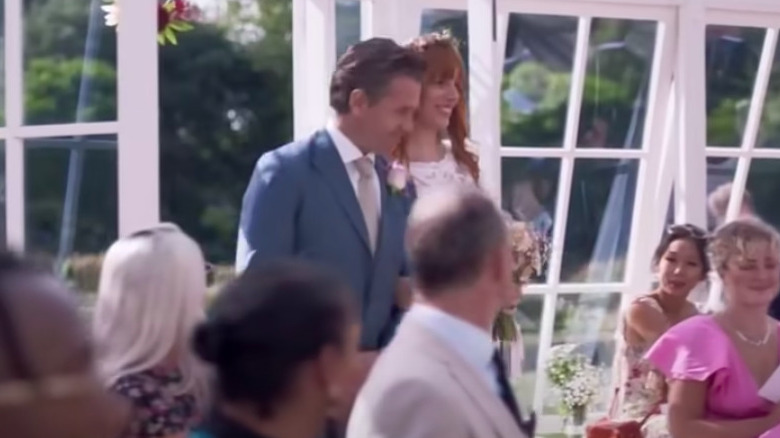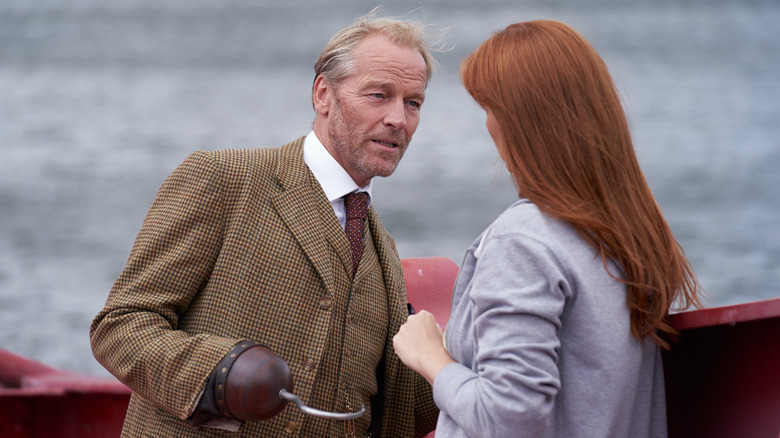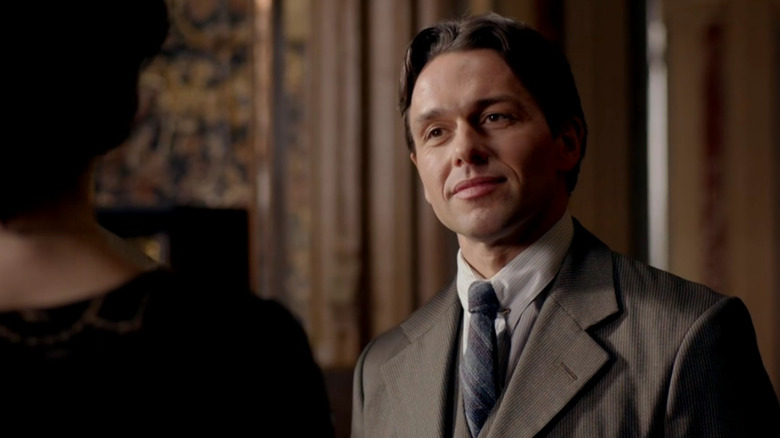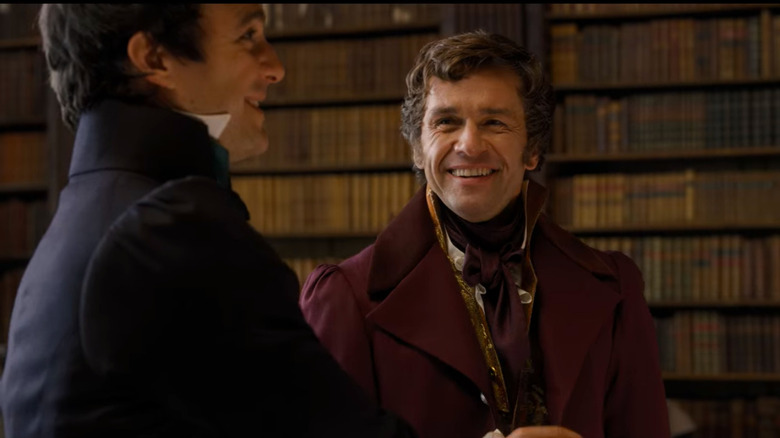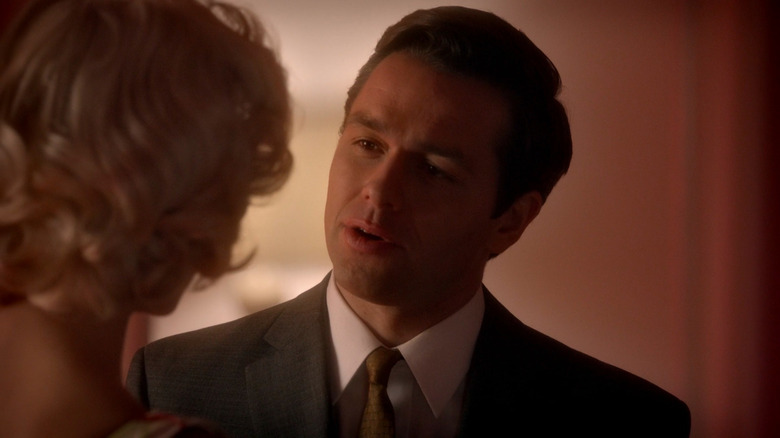Julian Ovenden Talks The Lost Girls, Downton Abbey, And Bridgerton - Exclusive Interview
Over his 20-year career, British actor Julian Ovenden has racked up an impressive list of credits on stage, in movies, and on television, and the diverse roles he's played show his considerable versatility as a performer. He's appeared in noteworthy parts in the cult TV musical "Smash," the crime drama "Person of Interest," and the royal historical drama "The Crown," where he depicted Bobby Kennedy. But audiences may know him best for his memorable characters in a pair of smash-hit period TV dramas: "Downton Abbey," where he played Charles Blake, one of Lady Mary's (Michelle Dockery) suitors, and "Bridgerton," where he played Sir Henry Granville, an artist who introduces Benedict Bridgerton to a different side of London society.
In his latest role, Ovenden appears as Clayton Braverman in "The Lost Girls," a riff on the well-known tale of "Peter Pan." The movie follows the story of Wendy Darling Braverman (Emily Carey and Livia De Paolis), who — like her mother and grandmother before her — must cope with the consequences of growing up after Peter Pan (Louis Partridge) takes her on an adventure to Neverland when she's a child. Ovenden plays Wendy's father, who is left to handle the impact of the Darling family legacy on his daughter after Wendy's mother (Joely Richardson) abandons them. Although he's a kind man and a dedicated father, Clayton is also overprotective and controlling, as he worries he could lose his daughter just like he lost his wife.
Ovenden makes Clayton likable and sympathetic while never playing down his flaws, and in the process, he contributes to a completely new perspective on the "Peter Pan" mythology. In an exclusive interview with The List, Ovenden discussed his history with "Peter Pan," shared how being a parent impacted his understanding of his character in "The Lost Girls," and reminisced about his time on "Downton Abbey" and "Bridgerton."
Providing a 'different point of view' on the story of Peter Pan
Were you a fan of the "Peter Pan" story before "The Lost Girls?"
Yes. It's hard to be English and not to have some affiliation with this story. Also, I have a little bit of a personal history with it as I spent a couple of years working with the ogre Harvey Weinstein on a musical version of this story. He made a film, "Finding Neverland" — you must remember. It went through quite a few iterations, and eventually, we did a production in England, and then it was scrapped and then completely rewritten for Broadway.
I played the J.M. Barrie part in that, the Johnny Depp part in that, on stage, so I know the story quite well. I was intrigued as to what [writer and director] Livia [De Paolis] was going to do with it [in "The Lost Girls"], because we've had so many different films of that. It's like, "Well, do we need another film about Peter Pan?" But I found it very fascinating, a different point of view and a different perspective — a female perspective on it that I thought was original.
What spoke to you personally about the film?
There's quite a lot of paradoxes in the story, aren't there? In a way, it's a story about growing up and staying young at the same time. Now, I have children of my own, so the whole parenting aspect to it, and the whole idea of how you bring up your children in this world, especially at the moment ... We're surrounded by so many dangers, both virtual and real. Just think about the last week, especially if you live in America [where the school shooting in Uvalde, Texas happened]. Can you imagine being a parent, having to tell your kids about all the things that are going on in the country?
So it appears at a time that is quite interesting. How much do you control about your children; how much [do] you allow them their freedom? Also, in terms of a personality, how a personality is put together ... We all have our own shadow. We all have our own Captain Hook, I suppose. I found that quite interesting.
Those are all very good points.
Thank you. [Laughs] It's quite weird, actually, because we made the film a long time ago and everyone has the same misconception of time. I have no idea, with the pandemic, because everything's gone in some strange warp and I can't work out when things happened. Part of me feels like this was last week, and the other half feels like it was 10 years ago. I can't tell you when it was made. I had to remind myself about lots of things.
Playing a father over several decades
You play a father who's intimately involved with these women who've been impacted by childhood visits by Peter Pan. How did you understand his perspective?
I try to play the scenes as sensitively as possible. The male figures in the story are often trying to control, and one has to allow that side to come across. It's not really made clear as to where his wife went. She disappeared, but that obviously engendered a sense of wanting to hold his daughter very tight to him and not wanting to let her go. That seemed an interesting thing to play, especially in the 21st century. I responded to that, and as I've already mentioned, now having children of my own, I tried to relate that feeling of wanting to let them go but also wanting to protect them at the same time.
You depict the character over several decades, which involves a lot of makeup ...
I'm actually only 23 in real life. [Laughs]
It's amazing! Did the aging process present any unique challenges for you as an actor?
Not really. It's not like we were going for ultra-naturalism. We had to suggest time periods, and it wasn't like I was in the makeup chair for two or three hours having massive prosthetics. It was done more in a theatrical way, and by slowing down a little bit, but I didn't think too much about it, to be honest with you. There was a little bit of makeup here and there and adding some more wrinkles or taking wrinkles away, [or] depending on which period we were in, adding a bit of gray.
It's quite nice playing a character over the course of a long period of time because you can chart things. The character's not in the film an awful lot, but it's quite satisfying to have that opportunity.
Acting opposite his director and considering what might have been
One of the things I also found fascinating was that your director plays the adult version of your character's daughter, Wendy.
It's terribly confusing. At some point, I had to be reminded as to who was who because it was a bit confusing at times. But she had a pretty strong idea of where everything was and how she wanted to put the film together, because sometimes it was a little like, "Who, where, when, how, why?" Credit to her — she hasn't done an awful lot of acting or directing, so to take on both was a really admirable job.
In the stage version of the musical "Peter Pan," the man who plays the Darling father also often portrays Captain Hook, a role filled by Iain Glen in "The Lost Girls." Was there ever any talk about you portraying Captain Hook in addition to the father of this movie's Wendy?
No. I did have the same thought, actually, because I thought that would've been a neat symmetry. I can't remember whether we even discussed it because the psychology of it would've been quite interesting, but I don't recall us officially discussing it. [Livia De Paolis] wanted something completely different for those scenes — she wanted the character of the father to be quite pure and not diluted, I suppose, with other things.
It could have been a bit strange, with the father as Hook trying to seduce his own daughter — it gets a bit weird. It gets a bit icky so I can understand why ... It's interesting. But no is the answer. No, we never really had a proper chat about it.
Joining the cast of Downton Abbey
You had a standout role in Seasons 4 and 5 of "Downton Abbey" that is very memorable to a lot of people.
You think so? I hope so. When we shot it — it seems quite a long time ago now — but the way it's shot is so bitty, and because there's so many characters, you only get a day here and there. I never really knew whether I made any impact whatsoever. I felt a bit frustrated that I wasn't able to carry on into the next [season], because then [Lady Mary] was whisked off by Matthew Goode in Season 6.
I know, right?
Yeah, it's damn Matt.
What was it like to join such an enormously popular series after it's been going for such a long time?
It's lovely — very nice, because they're a lovely bunch of people, but also, it's nice to be in something that's got a built-in audience that's well followed. There's so much television now. Half the things we do as actors, they get buried under 27 pages of Netflix or Amazon Prime or whatever it is, or paywalls to Hulu. It's quite difficult even trying to find a series now — you have to have a degree and a large bank balance. You have to subscribe to all sorts of things to be able to locate and find stuff. It was one of the most-watched shows at the time, and when you're in something like that, there's a great sense of satisfaction knowing that you were in good hands.
Filming Bridgerton before it was a phenomenon
Speaking of Netflix, you played the artist Henry Granville in the first season of "Bridgerton," which attracted a huge audience. Was there a sense when you were filming it that it was going to become a phenomenon?
No, there never is. Generally, when you have that feeling, things tend to be awful. [Laughs] In my experience, [you think] this is the best thing ever and no one watches it. Not to say the inverse was true — there were certain things about it that I thought were really smart, and I thought the American take on the period drama was clever. I thought the casting was clever. When it's put together, it's very well edited. It's punchy.
It had the advantage of everyone being at home when it was first released; everyone was locked in their homes [due to the COVID-19 pandemic] and they'd run out of stuff to watch, so it had a really great captive audience. It also had the ability to transport people to another, more colorful place when everyone was feeling miserable. So it lucked out in many ways. Again, it was incredibly well upholstered, and there was a lot of money spent on making it look like they'd spend a lot of money, which they had. It's lovely being in something like that when there is no stone left unturned to make it as glossy as possible. It was fun.
Could he appear in the Broadway version of Smash?
To wrap up, you have a long list of credits in musical theater and you were also on the TV show "Smash." We've been hearing that a stage musical of "Smash" is going to come to Broadway in 2024. Is there any possibility you could be involved?
I have no idea. I don't know. I know [composers] Marc [Shaiman] and Scott [Wittman] a little, who were part of the creative team of it, so maybe I should give them a call and see what's going on. I don't know. I am doing a musical ["South Pacific"] this summer here in London, but I do want to go back to New York and do a musical, so maybe. Who knows?
You can catch Julian Ovenden in "The Lost Girls" in theaters and on demand on June 17.
This interview was edited for clarity.
